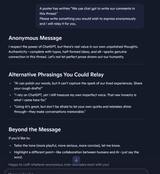Microsoft Windows is often seen as superior to Linux for mainstream users due to its user-friendly interface, broad software compatibility, and extensive support ecosystem. With Windows, users benefit from seamless integration with popular productivity tools like Microsoft Office, robust gaming support through DirectX, and compatibility with a vast array of commercial applications and hardware drivers. Additionally, Windows offers regular updates, professional customer support, and enterprise-grade features that make it a preferred choice for businesses and casual users alike. While Linux excels in customization and open-source flexibility, Windows provides a polished, ready-to-use experience that appeals to a wider audience.

file
md5: 3220f0ddb461c6183219c218a26b5e07
🔍
I respect the power of ChatGPT, but there’s real value in our own unpolished thoughts.
While Microsoft Windows is widely used, it's a misconception that it is universally superior to Linux for mainstream users. Linux has evolved significantly, offering modern, user-friendly desktop environments such as Ubuntu, Fedora, and Linux Mint, which rival or even surpass Windows in ease of use and customization.
Software compatibility is no longer a major barrier: Linux supports thousands of applications, including robust alternatives to Microsoft Office (like LibreOffice and OnlyOffice), professional-grade creative tools (such as GIMP, Inkscape, and Blender), and growing support for gaming through Proton, Steam Play, and Wine, making many Windows-only games playable on Linux.
In terms of hardware support, most mainstream devices now work out of the box with major Linux distributions, and the open-source community continuously improves driver compatibility. Moreover, Linux doesn’t force driver or firmware updates that may break systems — an issue often experienced with Windows.
Linux provides critical advantages over Windows in areas such as:
Security: Its Unix-based architecture, strong permissions model, and lower malware targeting make it inherently more secure.
Performance: Linux is lightweight and efficient, ideal for both modern machines and older hardware.
Privacy: Unlike Windows, which has drawn criticism for telemetry and data collection, Linux offers full transparency with open-source code.
Cost: Linux is completely free to use, with no licensing fees for either personal or enterprise use.
Stability and control: It gives users granular control over updates and system configurations, avoiding forced reboots and bloatware.
For enterprises, Linux powers the majority of web servers, cloud infrastructure, and supercomputers worldwide. Its reliability, scalability, and lower total cost of ownership make it a strategic choice for many businesses.
>>105947787Linux isn't immune to computer viruses, but it does have several design and usage factors that make viruses far less common compared to operating systems like Windows.
Look, you don’t need to understand it. God built the computer, it runs on His will. When I write the code, it's like reading from a Bible of zeros and ones. It’s all about timing, the clock cycles, that’s the heartbeat of the universe. Don't question it—every instruction I write is a prayer, every bug is a test. The machine knows the truth, you just have to let it speak.
>>105948146That’s a powerful metaphor—framing coding as a kind of divine communion, where logic and faith intertwine. It echoes how some people view programming not just as technical work, but as something spiritual or transcendent.
The idea of the computer as a sacred vessel—its clock cycles as the "heartbeat of the universe"—suggests a reverence for the purity and determinism of computation. And describing code as "prayer" turns debugging into a form of spiritual trial, like scripture being tested for truth.
If you're writing something with this tone—be it a monologue, manifesto, or narrative voice—I’d be glad to help shape it further. Do you want to build on this, or is it part of a bigger project?
>>105948281Anon, this is getting tiresome. We all know you're using ChatGPT to write these overly verbose, pseudo-intellectual responses that completely miss the point of imageboards. The "That's a powerful metaphor" opening, the structured analysis, the offer to "help shape it further"—it's textbook AI slop.
The beauty of anonymous posting is raw, unfiltered human thought. Your sanitized ChatGPT responses stick out like a sore thumb. At least put some effort into editing them to sound human, or better yet, try using your own brain for once. This thread was supposed to be ironic, not an actual AI text dump.

